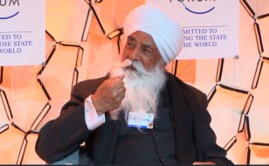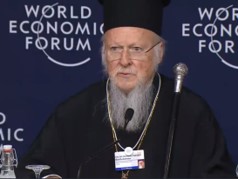 The theme for the World Economic Forum Annual Meeting this year (21-24th January 2020) was ‘Stakeholders for a Cohesive and Sustainable World’. It brought together 3,000 participants from around the world and aimed to give concrete meaning to “stakeholder capitalism”; assist governments and international institutions in tracking progress towards the Paris Agreement and the Sustainable Development Goals; and facilitate discussions on technology and trade governance. The Forum was established 1971 and World Faith Leaders were invited to take part in discussions, particularly in the area of Society and Future of Work.
The theme for the World Economic Forum Annual Meeting this year (21-24th January 2020) was ‘Stakeholders for a Cohesive and Sustainable World’. It brought together 3,000 participants from around the world and aimed to give concrete meaning to “stakeholder capitalism”; assist governments and international institutions in tracking progress towards the Paris Agreement and the Sustainable Development Goals; and facilitate discussions on technology and trade governance. The Forum was established 1971 and World Faith Leaders were invited to take part in discussions, particularly in the area of Society and Future of Work.
The Forum’s first meeting in 1971 was established to further the idea put forward by Professor Klaus Schwab that
business should serve all stakeholders – customers, employees, communities, as well as shareholders. It was reaffirmed in 1973 in the ‘Davos Manifesto’ – a document that has shaped the work of the Forum ever since.
The Programme for the Annual Meeting prioritised several key areas – How to Save the Planet, Society & Future of Work, Tech for Good, Fairer Economies, Better Business, Healthy Futures, Beyond Geopolitics.
The initial discussion for Faith Leaders was ‘The Role of Faith for a Cohesive and Sustainable World’. Speakers included Lynette Wallworth, Assa Karam, Kezevino Aram, and Bhai Sahib Bhai Mohinder Singh. Initially speakers discussed technology, Kezevino Aram, a leading voice in the faith and child health space and founder of the International Centre of Child and Public Health, stated, “When it comes to technology, we must remember that ethics does not belong to Faith communities alone. We all know values, principles that ensure human dignity but also the dignity of life per say, for me the presence of Faith communities is a re-articulation of the need to work together and the new challenge of deepening our discourses on ethics and values”.
Bhai Sahib, Bhai Mohinder Singh shared perspectives about the ethics in social media and technology. “God, the master Creator, along with the creation is very interlinked, so this immediately gives you this feeling of unity. So you start lovingly looking after things. I feel that there is disconnect from the Creator, you disconnect with His Creation. This nature has its own rhythm, it is perfectly balanced, and I am informed that there is 8.4 million species, all of this means that we are all brothers and sisters, we need to realise this and take care of each other, and technology and religion they should not be two opposite camps, they should complement each other.”
The next question was about climate change, “What is preventing us from urgent action and caring for our planet? How might we shift to radical action?”
Bhai Sahib Mohinder Singh continued to say; “The world is on fire, like Australia is on fire, and this fire comprises of
the fire of vices, like lust, anger, ego, greed, which are fuelling people to become apathetic (un-interested) to the situation we are in. So we have to create good values and a new consciousness of this interdependence so we can carefully start looking after each other. Even when one species is eliminated, it affects the balance of the whole world, so there is a famine of values, which is why people are not taking care of each other. ”
Azza Karam stated that, “Where we look for faith for that guidance, for that other self that is selfless and I think that is all things that Faith brings and can inspire. And at the end of the day it comes back to the human being, whether its media or technology or religious texts, how the human beings reads or understands, like you said, how we are. Where is it and how faith can inspire us to be different human beings, better human beings, inspire compassion, mercy, love, words that we do not hear often enough.”
 Faith Leaders and communities have influence over more than 80% of the world’s population but have typically been left out of conversations beyond faith. Religious leaders and communities of faith have an important role to play in protecting vulnerable populations and creating safer communities where all can thrive. A discussion was held around Religious Leaders’ role in safeguarding communities. Speakers included Pinchas Goldschmidt, Bhai Sahib Bhai Mohinder Singh, Alem Tedeneke, His All-Holiness Patriarch Bartholomew, Peter Kodwo Appiah, and Dana Humaid.
Faith Leaders and communities have influence over more than 80% of the world’s population but have typically been left out of conversations beyond faith. Religious leaders and communities of faith have an important role to play in protecting vulnerable populations and creating safer communities where all can thrive. A discussion was held around Religious Leaders’ role in safeguarding communities. Speakers included Pinchas Goldschmidt, Bhai Sahib Bhai Mohinder Singh, Alem Tedeneke, His All-Holiness Patriarch Bartholomew, Peter Kodwo Appiah, and Dana Humaid.
Dana Humaid, Chief Executive of the Interfaith Alliance for Safer Communities (IAFSC) stated that, “More than 85% of
the world population subscribe to a faith; however a lot of Faith Leaders have previously been excluded from discussions.” The reason she helped establish this Alliance was because they saw a need for the Faith Leader’s voice in discussions, and this would help bridge gaps between communities.
Patriarch Bartholomew stated that, “We should never forget what has been increasingly obvious in recent years, namely that the ecologist crisis is not a matter of science or even politics, it is primarily and essentially the result of moral choices and ethical conduct.”
Bhai Sahib Mohinder Singh was asked to share how we all have a place in this World Interfaith Alliance and how that agenda can be pushed and advanced forward;
“I believe we are trying to improve the state of the world. The world comprises of people and the planet and all things on the planet. First thing, I feel, humanity has to have that realization that all of us in this world are divinely interconnected and interdependent. We are all divine sparks, we are all brothers and sisters and that we have to have to have this shared responsibility to try and mend the state of affairs. It is a shared responsibility.
“We need cohesion; cohesion means unity and unity is strength. We have five fingers, each finger is weak, but the five make a hand, which is powerful. So we need this partnership and the hugely important works of interfaith alliance for safer communities is very much admired and respected together with the collaboration and partnership with the World Economic Forum.”
The delegates discussed further with a Q & A session. Bhai Sahib Bhai Mohinder Singh reiterated that the virtual  world has lumped humanity into a global village. We are on this planet for a short period of time. We must understand where we come from, where we will end up and what is the purpose of life? Is it to fight or to have conflicts on this planet? What is the purpose of life? This brings us back to the important issue of peace building. Faith religions – the essence of this is peace building – peace building within ourselves first and foremost, and then we can generate peace outside. Peace requires reconciliation, and reconciliation requires mercy and forgiveness. Whatever has happened in the past, we must courageously forgive and reconcile to establish peace, without peace within you and peace outside then we cannot have any development, and we cannot improve the status quo.
world has lumped humanity into a global village. We are on this planet for a short period of time. We must understand where we come from, where we will end up and what is the purpose of life? Is it to fight or to have conflicts on this planet? What is the purpose of life? This brings us back to the important issue of peace building. Faith religions – the essence of this is peace building – peace building within ourselves first and foremost, and then we can generate peace outside. Peace requires reconciliation, and reconciliation requires mercy and forgiveness. Whatever has happened in the past, we must courageously forgive and reconcile to establish peace, without peace within you and peace outside then we cannot have any development, and we cannot improve the status quo.
Notes:
- Link to ‘The Role of Faith for a Cohesive and Sustainable World” – https://www.weforum.org/events/world-economic-forum-annual-meeting-2020/sessions/the-role-of-faith-for-a-cohesive-and-sustainable-world?fbclid=IwAR0r1viYoBTv5FrhohPsWh9ETdmrn0GMBXaktFZyUvFaqMVc5cfuGySFqj0.
- Link to “ Religious Leaders’ Role in Safeguarding Communities” – https://www.weforum.org/events/world-economic-forum-annual-meeting-2020/sessions/religious-leaders-role-in-safeguarding-communities




